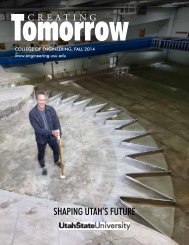Tomorrow
Create successful ePaper yourself
Turn your PDF publications into a flip-book with our unique Google optimized e-Paper software.
COLLEGE OF ENGINEERING<br />
Computer Science<br />
Crowding<br />
Out<br />
GOOD<br />
Dr. Kyumin Lee is no stand-up comedian but this Utah State University assistant<br />
professor in the Computer Science Department knows a thing or two about tough<br />
crowds and how to work them.<br />
He joins them. At least long enough to ascertain the negative impact bad crowds<br />
can have on the Internet and what can be done to remedy it.<br />
Dr. Lee recently received a Google Award to take on a monumental task of<br />
making the Internet world a better, more credible, place by detecting and preventing<br />
crowd-sourced manipulation of search engines and online social networks.<br />
In June he and his colleagues, Steve Webb (yes, Webb) with Georgia Institute of<br />
Technology and Hancheng Ge from Texas A&M University, presented their research<br />
on this topic that was also published in the 8th International Association for the<br />
Advancement of Artificial Intelligence Conference on Weblogs and Social Media. His<br />
research was also highlighted in June’s MIT Technology Review.<br />
What they unveiled was the first study and model, with an accuracy rate of 97.35<br />
percent, to automatically detect malicious crowdsourcing activity slithering through<br />
search engines, online user traffic and social media sites. They’ve basically developed a<br />
virtual vaccination to protect against these spurious activities. It’s a powerful tool that<br />
ultimately they hope to widely deploy to help protect the Internet’s overall integrity.<br />
They began by looking under the rocks of crowdsourcing systems in search of<br />
nefarious critters scurrying about. In the process, they uncovered some pretty filthy<br />
rich people, including one seller from Moldova who earned at least $3 million over the<br />
past two years through dubious data manipulations of various sorts with the help of a<br />
host of workers under him.<br />
In the active and growing world of online marketplaces, tens of thousands of<br />
sellers legitimately offer a broad spectrum of services at bargain prices for buyers. For<br />
example, on Fiverr, a popular online marketplace for human services, a seller offers to<br />
write five snappy taglines for $5. For the same price, people will sing and record songs,<br />
make logos or messages appear out of clay, perform virtual assistant duties and write<br />
press releases.<br />
It’s good for the sellers and great for the buyers, Dr. Lee says.<br />
With most all the good things that humans create, however, inevitably there is a<br />
dark side. Bad things begin to happen<br />
when sellers cross the ethics line<br />
and offer buyers shady deals such<br />
as manipulating a website’s<br />
Page Rank score or artificially<br />
propagating a message<br />
through a social<br />
network or artificially<br />
adding friends to a<br />
social networking<br />
account.<br />
10 UTAH STATE UNIVERSITY I COLLEGE OF ENGINEERING<br />
Dr. Kyumin Lee<br />
That’s what happens when sellers<br />
engage individual workers to create<br />
bogus information that amass into<br />
impressively high numbers. This is<br />
called crowdturfing. It is a combination<br />
of crowdsourcing and astroturfing.<br />
While crowdsourcing, such as Fiverr<br />
and Amazon’s “Mechanical Turk”<br />
provide legitimate online marketplaces,<br />
astroturfing involves using fake names to<br />
do things like post positive or negative<br />
reviews.<br />
People in developing countries,<br />
where labor is cheap, can make a good<br />
living doing this.<br />
“They can earn enough salary while<br />
working on this kind of job at home,”<br />
Dr. Lee says. “One guy in Bangladesh can<br />
earn three or four times the salary of the<br />
average worker in his country.”<br />
Such a person may know it is<br />
unethical but he likely justifies it as being<br />
fairly harmless, he says.<br />
“When you aggregate this<br />
misusing behavior, however, the impact<br />
is significant,” Dr. Lee says. “These<br />
crowdturfing tasks threaten the entire<br />
web ecosystem because they degrade the<br />
trustworthiness of information. That’s<br />
why Google and federal agencies are so<br />
interested in this problem.”<br />
Dr. Lee and his colleagues<br />
hypothesized that crowdturfing poses<br />
a serious threat but they wanted to<br />
determine to what extent such activity<br />
actually affects the web ecosystem. To<br />
answer that question, they devised a<br />
way to measure real-world impact of<br />
crowdturfing gigs.<br />
Their case studies brought them<br />
directly in contact with some of the<br />
unethical sellers peddling their wares.<br />
They carefully investigated the top seller’s<br />
gig (task) descriptions to identify which



